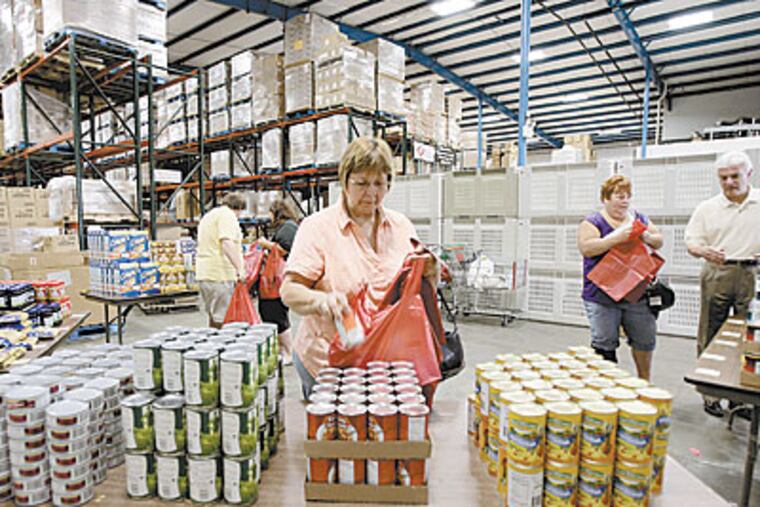Paychecks stalled, state workers seek help
As a caseworker for the Pennsylvania Department of Public Welfare, Charlotte Dorfman spends her days evaluating applications and determining whether people are eligible for food stamps or cash assistance.

As a caseworker for the Pennsylvania Department of Public Welfare, Charlotte Dorfman spends her days evaluating applications and determining whether people are eligible for food stamps or cash assistance.
Now Dorfman says she is a step from landing on the other side of the desk at her office in Darby.
"I'm looking at no paycheck" this week, Dorfman, 56, said last week. "That sent shivers down my spine."
She is one of 77,000 state employees who have received only a portion of their paychecks, for work in June, since the Pennsylvania budget crisis began July 1, the start of the fiscal year. Under state law, the government cannot pay workers until the legislature adopts a budget.
If there is no budget deal this week, Dorfman and tens of thousands of others will come up empty Friday.
Many of them are haunted by the fear and uncertainty over how long the budget standoff will last. That, along with quickly draining bank accounts, has sent a flood of workers to a place they never thought they'd have to go: an emergency food bank.
Last week, more than 1,500 state employees stood in line at Harrisburg's Central Pennsylvania Food Bank when it opened specifically to help them. The center normally acts as a distribution center for smaller food pantries.
"It's not something we do on a day-to-day basis," executive director Kendall Hanna said. "I was mentally prepared for 1,000 overall, and there were 1,300 in our first two days.
Linda Barnes, a nurse's aide in a state care facility, and two of her coworkers drove 60 miles from Chambersburg to the food bank Friday to load pasta, fruit cups, tuna, and cereal into the three bags each was allotted.
The groceries will feed Barnes' family of six for two days, she said, and under the food bank's rules, she won't be able to restock there for two weeks.
"It was either this or put gas in the car," said Barnes, 38, who Friday received a check that gave her about 20 percent of her pay. The idea of going to a food bank when she has a job troubles her.
"I shouldn't be in a situation where I have to go to a food bank," she said. "It's supposed to be for people who can't work or are between jobs."
The Philadelphia area has about 10,000 state workers and a far larger population, so the problem is not as visible as it is in the capital, but it is no less painful for those in the same predicament.
Philabundance, Southeastern Pennsylvania's largest hunger-relief organization, has received several calls from state employees and human-resources managers for state agencies, communication manager Marlo DelSordo said. Philabundance has distributed some emergency food boxes containing 30 pounds of nonperishables to state workers, she said.
"People are anxious and emotional," DelSordo said.
Gov. Rendell has said he tried to ease the burden by working out special no-interest loans through banks and credit unions. About 60 percent of state workers have used the short-term loans, Rendell said, but Dorfman, who lost her house to foreclosure in 2002, and others said they didn't qualify.
"I don't have the best credit," said Sandy Palmer, who has worked for the Department of Revenue for 23 years. Palmer, 59, a widow who makes $44,000 a year, received her last partial paycheck - for $209 - Friday.
"I'm one paycheck away from the poorhouse," said Palmer, who has already overdrawn her bank account.
She picked up some peanut butter and macaroni at the food bank but fretted about her pending utility bill and coverage on her hard-to-insure mobile home in Middletown, east of Harrisburg.
"I have to decide today which bills to pay: Will it be rent or car insurance or prescriptions?" said Dorfman, who makes $37,000 a year and spends at least $250 a month on prescription drugs to control a number of debilitating conditions, including diabetes and autoimmune disorders.
She can't turn to her own agency for help because she wouldn't meet income requirements.
Dorfman lives in Bryn Mawr - "We rent," she's quick to add - with her husband, Jeffrey, who makes about $40,000 a year working for the state employment office in Philadelphia. He is still being paid because his office is supported by money that is not part of the budget negotiations.
"My colleagues are applying for food stamps, but I wouldn't qualify," she said. "That's the ultimate slap in the face."
State workers are venting their frustrations in Internet chat rooms and participating in protests, including one scheduled for Tuesday on the Capitol steps.
Barnes is considering setting up a stand, like the Salvation Army, outside a Wal-Mart, asking help for state workers.
Neither Rendell nor legislators are receiving pay, either, but lawmakers are allowed to collect $158 a day in expenses when they go to Harrisburg. Workers' pay will be restored when the budget standoff is resolved, but it could take an additional week for checks to go out again.
"I used to be proud to say I was a Pennsylvanian," Dorfman said. "But now it feels like the bottom's falling out and somehow we're just pawns in the middle."